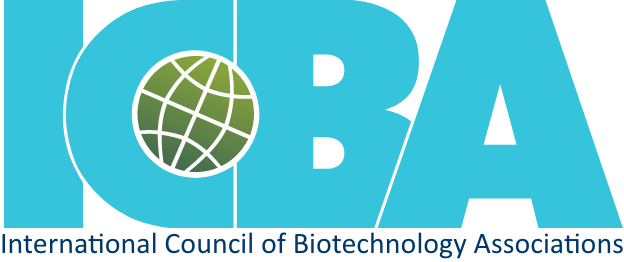Crossposted from Intellectual Property Watch
A delegation of heads of biotechnology companies visited Geneva this month to present the International Confederation of Biotechnology Trade Associations (ICBA). The ICBA was created in 2012, but is now looking to make its voice heard in Geneva and inform policy discussions, and is finding it is not easy to become an observer in some organisations. They also underlined the importance of intellectual property for the biotech sector, in particular to attract indispensable capital.
The delegation sat down with Intellectual Property Watch’s Catherine Saez to talk about their Geneva visit.

The delegation included: Andrew Casey, president and CEO of BIOTECanada, who led the delegation; Steve Bates, ICBA vice-chair, and CEO of the UK Bioindustry Association; John Brennan, secretary general for EuropaBIO; Viola Bronsema, CEO of Biotechnologie-Industrie-Organisation Deutschland; Joe Damond, ICBA executive director, and executive vice president of the Biotechnology Innovation Organization (BIO); and Siya Ntutela, CEO of AfricaBio.
Casey, Bates and Damond explained that their association is predominantly composed of small and medium-sized enterprises (SMEs), most of them start-ups, working in different fields of biotechnology, such as health and agriculture.
Casey said a large number of BIOTECanada members are small pre-commercial companies, which have intellectual property and an idea that they are trying to commercialise. Bates also said IP is essential for the members of the UK Bioindustsry Association, in particular to gain finance.
Bates said Geneva is at the heart of trade, intellectual property, and health discussions.
Biotech Industry to Inform Policy Discussions
The ICBA was not set up for lobbying purposes, Casey said. It was more of a discussion table and now as part of a maturation process is trying to see how the biotech industry can inform the discussions, he said.
Bates added that the ICBA brings an international perspective on the issue. Damond said that part of the idea is to gather resources to come up with positions on issues that affect all biotechnology companies. It is very important to convey the globality of the biotech industry, he said.
Often in Geneva, the discussions are polarised between North and South, developed and developing countries, but that is not the way this industry necessarily looks, Damond said, as good science happens everywhere, in China, in India, and Brazil. In those countries, biotech companies also rely on IP rights and are trying to do deals with companies globally.
The Geneva visit was to convey information about the biotech industry, he said, and to get a better sense of in which issues and which organisations in Geneva “we might want to get more involved.”
The ICBA would be interested, to begin with, in trying to become more of a stakeholder in some Geneva organisations and “make our case about why we should be involved,” Damond said. But this “is not so easy to do with respect to some of those organisations,” he said.
The ICBA would be interested in several organisations in Geneva, including the World Intellectual Property Organization, World Health Organization, and World Trade Organization, in order to participate in discussions that relate to the biotech industry, he added.
Answering a question about the widening gap between technological advances and international policymaking, Damond said if the institutions in Geneva are going to keep up with the technology, they have to be talking to the people who are involved in the technology. “That’s common sense,” he said.
“It is somewhat instructive that it is not particularly easy in those institutions to have the industry actually become a stakeholder,” said Damond. “There is a lot of suspicion … and frankly, looking at the work programme in some of those institutions, they are fighting issues that were much more important 10 or 15 years ago, as opposed as what is coming up around the corner.”
“A big part of our mission this week is just to let people know that we exist and that we are ready to provide input on issues as they arise,” he said, “or to help them think ahead.”
Damond also said very few governments have an integrated policy perspective. “You have science and technology agencies, and economic development agencies,” which are very keen to promote and develop investment research in the biotech sector, but on the consuming end there are other agencies, like health ministries, sending other signals, and it is very confusing for SMEs.
“We urge governments to look at the technology in a holistic way,” in terms of costs, and benefits, to the economy, to the health of their people, to the agriculture sector, and other sectors, and to come up with a set of policies that take all that into account, instead of having different ministries addressing different pieces of the technology, he said.
According to Casey an uninformed policy process or ill-informed policy process ends up in bad policy. “If you actually want to have good public policy, you need to hear from as many stakeholders as possible, otherwise you end up with a fairly biased policy in one direction which may not be good at the end of the day, ” he said.
The Quest for Investment, IP Key
Casey said biotech innovations are mostly coming out of university labs and research institutes, but then require significant amounts of investment to get from the lab bench to commercial reality.
Investors are in limited supply, and companies are forced to look beyond domestic pools, he said. What those companies have is their good idea, and they are trying to attract investors to go for commercial success. Ideas will follow investment, wherever it is and might leave the country, he said, explaining that in the quest for investors, intellectual property has to be “protected and guarded,” as it is an important asset.
Bates said innovation is like a team sport, as in order to take a breakthrough in the lab and transform it into a product serving humanity, a whole innovation process needs to happen. Governments can be a procurer of innovation, he said, adding that some global initiatives around infectious diseases or antimicrobial resistance show how the international community can stimulate innovation.
Intellectual property is important, Bates said, as scientists can continue to ask research funders for continued funding, they can publish papers. But the challenge with that route, Bates said, is that usually universities and the research community are interested to be in high profile publications. If scientists want to turn their discoveries into something that will make a difference, Bates said, there is a “host of other challenges and hurdles that you need to go through, and it is unlikely that your university research lab has the capability to do all of those steps you need to go through.”
Those steps might include investigating whether your product is safe and efficacious, replicable, scalable, and whether clinical trials can be carried out, Bates explained. If the research funding is not available, the only other way is to secure a patent on the invention and seek private sector investment for the project.
There are challenges with the patent system, but the alternative is trade secrecy, which locks the information forever, he said. IP enables the translation of the newest ideas through a “quite short” monopoly, he said, compared with the terms of protection offered by copyright. After the patent expires, the instructions are available for generations, he said.
Damond also underlined the issue of access to capital. “There are more ideas out there, more people who have a desire to bring those to market, than there is capital,” he said. There is not enough capital in governments or in pharmaceutical companies to finance those ideas, and many of those ideas are financed by venture capitalists, he added.
With most of those projects failing, venture capitalists are willing to take high risks with the hope that one of those projects will pay off, he said. Venture capitalists will try to evaluate the potential market for the project, but before that will make sure that IP rights are surrounding the project. If there are none, then “there is not a venture capitalist in the world who is willing to invest,” he said.
IP is also an increasingly central aspect of cross-border collaborations, he added.
Casey concurred and said if patents are not secured, investors “will not come,” as “IP is the only thing they feel secure to protect their investment.”

